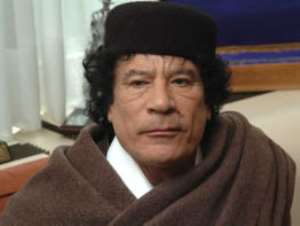
Libya is beginning a week of celebrations to mark 40 years since the coup that brought Colonel Muammar Gaddafi to power.
Many African leaders are already in Libya for an African Union summit that was held on Monday.
They will attend a big military parade and festivities to mark the occasion.
But most Western leaders are staying away, amid a political storm over the release and return to Libya of the only man jailed for the Lockerbie bombing.
Scottish authorities freed Abdel Ali Mohammed al-Megrahi on 20 August after he had served eight years of a life sentence for the 1988 bombing of Pan Am flight 103, in which 270 people died.
His subsequent hero's welcome in Tripoli generated anger in the US and UK. The British government has also been forced to deny reports that his release was linked to an oil deal.
As Libya marks its anniversary, British authorities say they will publish all correspondence with Scottish ministers over his release.
Celebrations
Huge crowds are expected in Tripoli's Green Park as the country marks Revolution Day.
Hundreds of dancers and musicians will take part in a show charting 12,000 years of the land's history.
After the show comes a fireworks display, with pyrotechnics launched from ships off the coast of Tripoli. Celebrations will last for a total of six days.
Among the dignitaries at the anniversary celebrations will be several African heads of state who were attending Monday's African Union summit in Tripoli.
The one-day meeting focused on the continent's main trouble spots, including Sudan's Darfur and Somalia.
But it ended without any concrete proposals on the conflicts, with the leaders merely adopting a "Tripoli Declaration" and plan of action "to find urgent solutions to crises and conflicts" in Africa.
World leaders attending include Venezuela's Hugo Chavez, but Western leaders will be largely absent.
Col Gaddafi took power on 1 September 1969 after a bloodless coup against the king.
A small group of military officers led by the then unknown 27-year-old army officer staged a coup against King Idris, who was exiled to Egypt.
The new regime, headed by the Revolutionary Command Council, subsequently banned political parties.
For years, Libya was ostracised by Western democracies who accused it of fostering terrorism abroad and displaying nuclear ambitions.
But relations improved after Col Gaddafi renounced his pursuit of nuclear weapons in 2003.
Libya also paid hundreds of millions of dollars in compensation to victims of the Lockerbie bombing.




 Elisu By-election: "If you call yourself a man, boo Chairman Wontumi again" — Bo...
Elisu By-election: "If you call yourself a man, boo Chairman Wontumi again" — Bo...
 Fuel tanker driver escapes with his life after tanker goes up in flames near Suh...
Fuel tanker driver escapes with his life after tanker goes up in flames near Suh...
 Uniform change: ‘Blue and white are brighter colours’ — Kwasi Kwarteng explains ...
Uniform change: ‘Blue and white are brighter colours’ — Kwasi Kwarteng explains ...
 MoE not changing all public basic school uniforms but only newly built ones — Kw...
MoE not changing all public basic school uniforms but only newly built ones — Kw...
 We’re only painting new public basic schools blue and white – Dr. Adutwum clarif...
We’re only painting new public basic schools blue and white – Dr. Adutwum clarif...
 Bawumia has lost confidence in his own govt’s economic credentials – Beatrice An...
Bawumia has lost confidence in his own govt’s economic credentials – Beatrice An...
 I fought WW2 at age 16 – WO1 Hammond shares At Memoir Launch
I fought WW2 at age 16 – WO1 Hammond shares At Memoir Launch
 GRA-SML deal: Regardless of what benefits have been accrued, the contract was aw...
GRA-SML deal: Regardless of what benefits have been accrued, the contract was aw...
 April 26: Cedi sells at GHS13.75 to $1, GHS13.18 on BoG interbank
April 26: Cedi sells at GHS13.75 to $1, GHS13.18 on BoG interbank
 Champion, promote the interest of women if you become Vice President – Prof. Gya...
Champion, promote the interest of women if you become Vice President – Prof. Gya...
